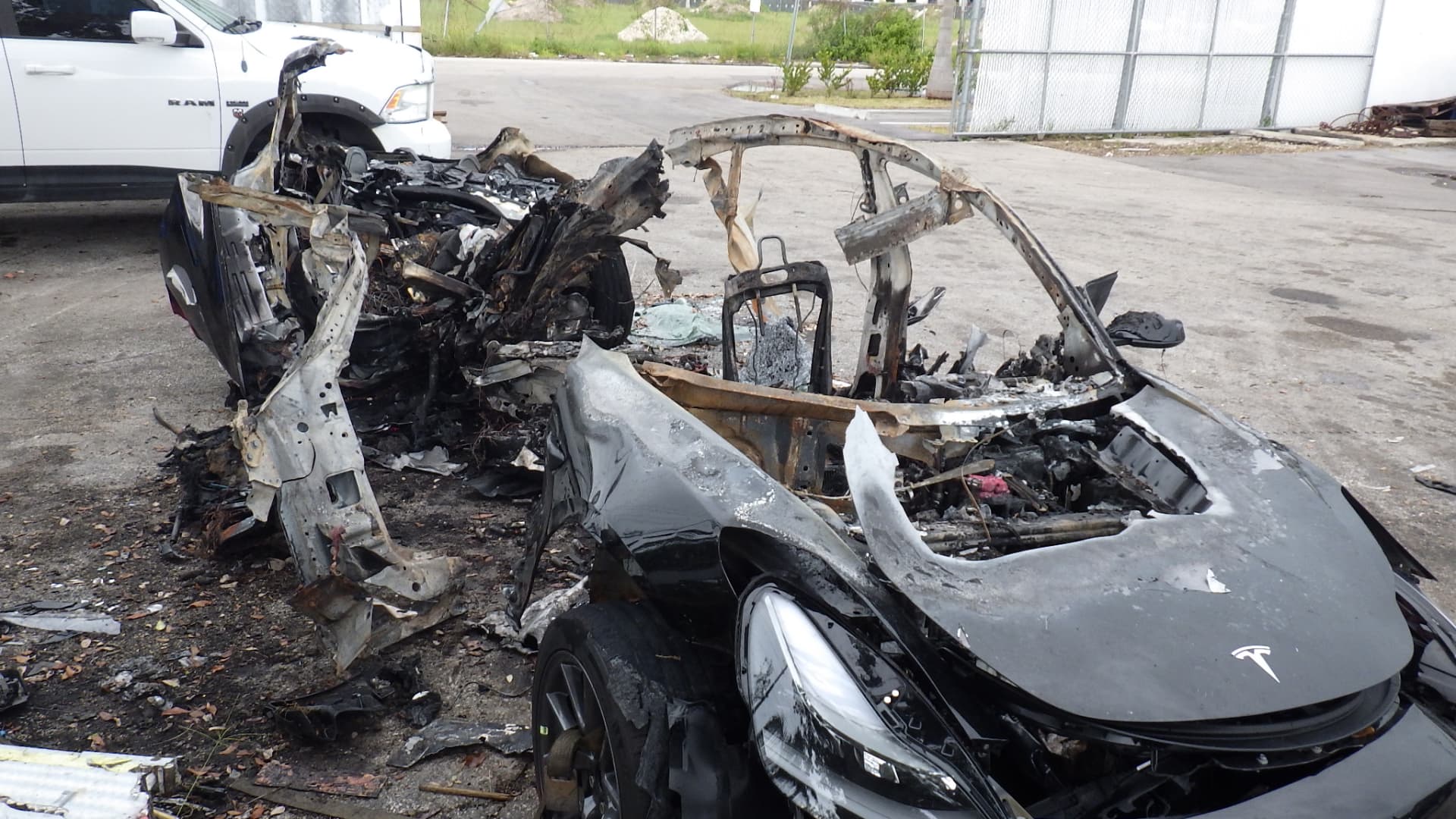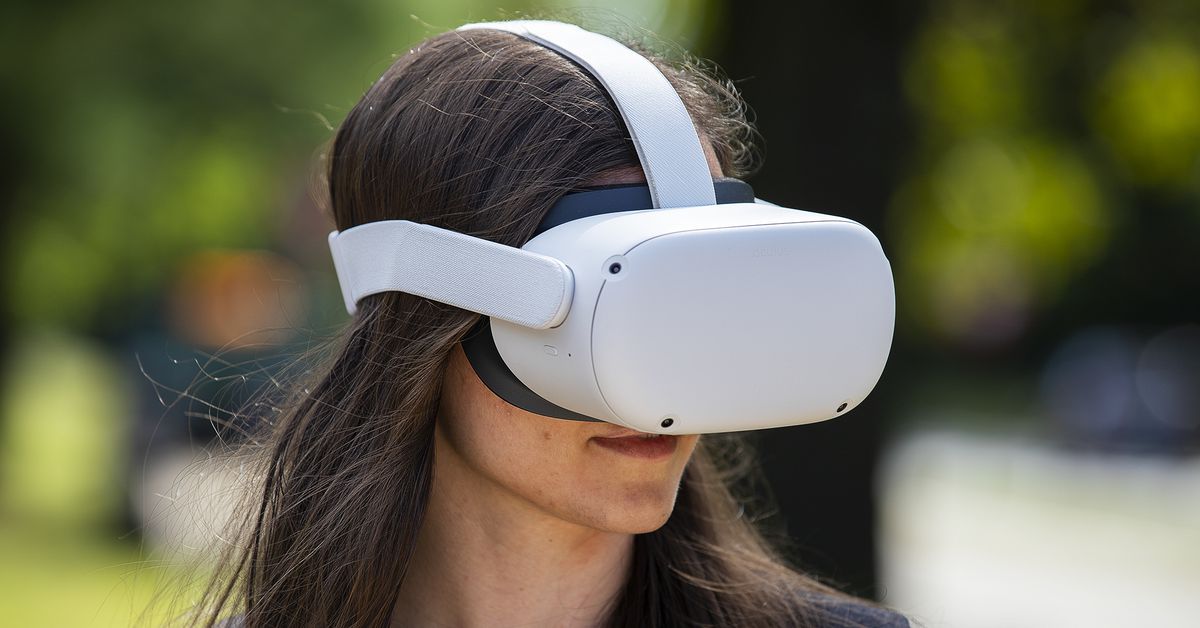U.S. safety agency says Tesla accounts for most driver-assist crashes, but warns data lacks context
Federal safety officials stressed that the data is not meant to portray whether one advanced driver-assist system is safer than another.

The NTSB released this image of a 2021 Tesla Model 3 Long Range Dual Motor electric car that was involved in a fatal accident near Miami that killed two people on Sept. 13, 2021.
NTSB
Tesla vehicles have accounted for nearly 70% of reported crashes involving advanced driver-assist systems since last June, according to federal figures released Wednesday. But officials warned that the data is incomplete and isn't meant to indicate which car maker's systems might be safest.
The National Highway Traffic Safety Administration said the first-of-its-kind data doesn't yet have proper context and is only meant to be a guide to quickly identify potential defect trends and help determine whether the systems are improving the safety of vehicles.
"I would advise caution before attempting to draw conclusions based only on the data that we're releasing. In fact, the data alone may raise more questions than they answer," NHTSA Administrator Steven Cliff said during a media event.
According to the data, Tesla cars represented 273 accidents involving its advanced driver-assist systems since companies were required to start reporting the incidents roughly a year ago. That's out of 392 crashes reported overall by 11 automakers and one supplier from June 2021 through May 15.
Honda was second with 90 reported accidents, followed by Subaru at 10 and Ford Motor at five. All other companies reported four or less accidents, including Toyota at four, BMW at three and General Motors at two.
The data release is the first since the government began mandating in June 2021 that companies report incidents involving "Level 2" advanced driver-assist systems, which are meant to help an attentive driver but not replace them. They include Tesla's systems such as Autopilot and GM's Super Cruise.
The systems can control many of a vehicle's driving functions such as steering, lane-centering, braking and acceleration. Some automakers including GM only allow the systems to be used on designated highways. Tesla and others allow for broader use, including on local streets.
The data does not take into context factors such as the number of vehicles automakers have made, the number of vehicles they have on the road or the distances traveled by those vehicles. When and how much data companies provided also varies, meaning much of it is incomplete.
For example, crashes involving advanced driver-assist systems have resulted in at least six fatalities and five serious injuries, according to the data. However, whether there were injuries in a majority of the crashes – 294 of them – is unknown, meaning there are likely more.
"This is an unprecedented effort to gather nearly real time safety data involving these advanced technologies," Cliff said. "Understanding the story that the data tell will take time as most of NHTSA's work does but it's a story we need to hear."
Tesla
While Tesla cars with the company's "Autopilot" technology had the most accidents, it's believed the company also has the most number of vehicles with such systems on the road. Its systems also tend to offer greater capabilities and are allowed to operate in more areas than other systems.
Tesla's systems are marketed under the brand names Autopilot, Full Self Driving and Full Self Driving Beta in the U.S.
Tesla's celebrity CEO Elon Musk recently on Twitter said that the company's latest version of FSD Beta would be rolling out to 100,000 cars. The company did not immediately respond to a request for comment.
According to the Associated Press, Tesla has more vehicles with partly automated systems operating on U.S. roads than most other automakers do — roughly 830,000, dating to the 2014 model year. And it collects real-time data online from vehicles, so it has a much faster reporting system. That compares to GM, which has reportedly sold more than 34,000 vehicles since the debut of its "Super Cruise" system in 2017.
The NHTSA has intensified its focus and investigations on Tesla because of the company's aggressive expansion of advanced driver-assist systems, including prototype software for Tesla owners.
In February, Tesla said it would recall software from 53,822 of its Model S, X, 3 and Y vehicles in the U.S. to eliminate a feature that lets cars automatically roll past stop signs. The cars featured a relatively new version of the company's Full Self-Driving Beta software.
That program gives Tesla drivers early access to new features that aren't completely debugged yet, including "autosteer on city streets," which let drivers automatically navigate around complex and crowded urban environments without moving the steering wheel with their own hands. Despite the name, Full Self-Driving Beta does not make Tesla vehicles autonomous.
Ongoing data collection
Release of the data comes nearly a year after the NHTSA issued an order requiring automakers and operators of vehicles equipped with advanced driver assistance or automated driving systems to immediately report crashes.
NHTSA also released a separate report on higher-level systems, known as automated driving systems, that can include the vehicles largely driving themselves. Most of these systems are still being tested and not available to the public, but some companies such as Alphabet's Waymo and GM's majority-owned Cruise have opened operations to the public.
NHTSA says there have been 130 reported automated driving system crashes from June 2021 to May 15. Waymo, at 62, had the most. It was followed by Transdev Alternative Services at 34, and Cruise at 23 (excluding 16 crashes reported separately by GM). Twenty-five companies reported crashes. They ranged from traditional automakers to one crash each from Tesla and Apple, which has reportedly been working on such a vehicle for years.
The agency plans to release data updates monthly regarding the systems.
– CNBC's Lora Kolodny contributed to this report.

 KickT
KickT 































